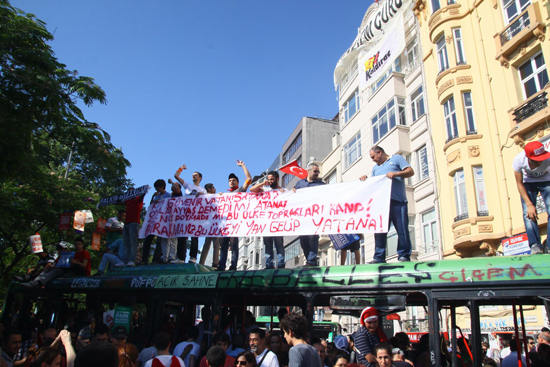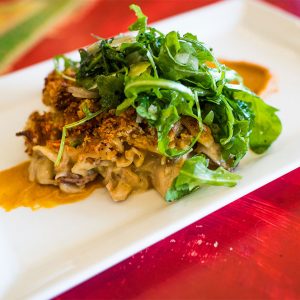Although they were ignited by a plan to turn Istanbul’s last remaining green space into a giant mall, the recent protests spreading across Turkey reflect its citizens’ long-simmering resentment over government intrusion into their lives, says Jenny White. An expert on contemporary Turkish culture and politics and author of three scholarly books as well three novels set in Turkey, the College of Arts & Sciences professor of anthropology has been blogging about the uprising, which erupted May 31 in Istanbul’s Taksim Square. The unrest has now spread to the capital of Ankara, Adana, Mersin, and other cities. Addressing a crowd of supporters on June 9, Turkish Prime Minister Recep Tayyip Erdoğan decried the protests, which have killed at least three people, including a policeman, as being instigated by looters and “vandals” who have no respect for the democratic process.
Bostonia checked in with White about what is behind the growing protests and the reasons for widespread Turkish opposition to Erdoğan, a democratically elected leader who has been in office for 10 years.
Bostonia: Were you in Istanbul when the protest began?
White: I left Istanbul a few days before the protest began, but I have been following social media in Turkey and blogging about the protests on kamilpasha.com. I plan to return a few weeks from now. I don’t know what I’ll find when I do.
What was it about the clearing of Gezi Park that elicited such rage?
The fact that the prime minister himself had decided that he wanted the park, the last green space in downtown Istanbul, replaced by a mall despite the wishes of the residents was the last straw in a long litany of complaints about the autocratic attitude behind the ruling AKP (Justice and Development Party) and the government’s massive transformation in Turkey of everything from infrastructure to people’s private lives. The decision to make Gezi Park into a mall followed many other major nationwide building and so-called renewal projects that razed historic neighborhoods and despoiled the environment, replacing natural areas with concrete and displacing working-class communities in historic areas to make room for gentrified middle-class generic housing that benefited primarily the AKP elite. There were well-founded accusations of corruption in these building projects that implicated the prime minister’s family. While the country as a whole benefited from many of the infrastructure renewal projects, particularly in transportation, other values regarding personal freedoms and the environment were completely disregarded. The Gezi Park uprising was not just about the trees.
In what ways is the Turkish government increasingly trying to govern people’s private lives?
Turks today are enraged by the government trying to dictate what they should wear, what they should drink (restrictions on alcohol), and what they should do with their bodies (for instance, government urging that women should have three children and stay at home, and fiats restricting abortions and Cesarean sections) and the increasing arrogance of AKP supporters in demanding that only their norms be represented in society (confronting men and women kissing in public or strolling in a park together). Statistics show an increase in violence against women, which is higher in Turkey than in the European Union or the United States, yet the government has shut down women’s shelters and shown little interest in dealing with the problem.
Can you characterize the majority of the protestors?
One of the unique characteristics of the Gezi uprising is that the protestors are mostly young (half of Turkey’s population is under 30) and that they cross lines that previously had divided Turkish society. Pious people, liberals, conservatives, anarchists, artists, cabdrivers, shopkeepers, college students, and working-class soccer club fans all mingle in the streets and support one another. The protest is not about Islam versus secularism; the issues cross those lines. It is about a government that believes, and states quite openly, that because it won over 50 percent of the vote in the last election, it has the right to decide what to do without input from the population, because the 51 percent gave it a mandate.

Protesters perch on top of a bus in Istanbul’s Taksim Square last week.
You write on your blog that Erdoğan and the AKP have “crossed the line.” Is the increasingly authoritative nature of his rule unexpected?
An authoritarian, strongman government has been the status quo in Turkish politics since it was founded (in 1923) by Mustafa Kemal Ataturk, a great leader who imposed his will and his vision on the new nation. The mantle was taken up by the Turkish military and by various politicians. The violent breakup of demonstrations of all kinds by heavily armed police was “normal,” and in the past, demonstrators were killed, arrested, and tortured with impunity. The police were and are rarely called to account for their actions.
When the AKP was elected in 2002, they reached out to liberals and minorities, including non-Muslims and Kurds, and passed some laws that improved women’s rights. The army, which had made a habit of coups, was made incapable of meddling in government. Many hoped that this would be the beginning of a process of rapprochement between different parts of Turkey’s population that had been at odds with each other because of state repression of one side or another. This period lasted about four years, until Erdoğan began to show signs of snapping back to the Turkish status quo of autocracy, intolerance, illiberalism, and misogyny. Many believe that he has wasted the opportunity, had he remained on the path to make Turkey a peaceful, united, prosperous, and free country, to be seen as Turkey’s greatest statesman since Ataturk.
Turkey is often viewed as a nation with an identity crisis. Can you elaborate?
Previous Kemalist-inspired governments taught children that Turkey was a country under siege by unspecified outside powers that aimed to undermine it at all costs, so Turkey needed the unquestioning obedience of its population (citizenship was defined as dying for your country) and the protective cloak of a powerful military. No backtalk or thinking outside of this box was permitted. These ideas were reinforced throughout a Turkish citizen’s life by means of army service and a variety of rituals, movies, and media programs. The spirit was very much inward-looking: Turkey for the Turks.
The AKP government revived and largely reinvented Turkey’s past as a former world empire, the Ottoman Empire, which gave it national pride and the ability to deal with the world politically and economically without always looking over its shoulder. The spirit now is outward-looking, proglobalization. This “new” Turkey also has room for minorities and for piety, both of which were repressed under the Kemalist regimes. As a result, Turkey has been transformed from an embattled security state into a nation of overseas opportunists and a new Islamic bourgeoisie at home that flaunts its wealth and power, pushing those with secular lifestyles to the margins.
How deep is the division between secular Turks and the Islam-based ruling party and government? Is the division obvious on the streets, in schools and universities, and in daily life?
Many in Turkey see these complex issues in highly personal terms. So it is not unusual for women with headscarves to feel uncomfortable in secular areas and vice versa. This has been exacerbated in the previous decade as the differences have become politicized. Turkey’s youth appears to have a more liberal attitude about mixing pious and secular lifestyles, but youth (and women) have little say in Turkey’s political life, which is essentially run by old men. Taking to the streets in complex configurations that defied these simplistic divisions was really the only avenue available to youth to make itself heard. Young people have no say in government or in any of the political parties and civil society, and the media have been cowed by arbitrary arrests and fines.
There is some reference in the media to a Turkish “Arab Spring.” What are the similarities to, say, the 2011 protests in Cairo’s Tahrir Square, and what are the important differences?
Turkey’s government has been freely elected, and no one, not even the protesters, disputes that. There is no desire to overturn the system or even kick out the elected AKP. There is great dissatisfaction with Erdoğan, who is not acting democratically, and people would like to see his party remove him as prime minister, although realistically no one believes this would happen. But it is unlikely that he will be deposed and not at all likely that the government will fall. Perhaps that is Erdoğan’s calculation. He reiterates over and over that he won 51 percent of the vote.

Protests are spreading throughout Turkey after demonstrators gathered in Istanbul (above) on May 31.
What are the deepest fears and concerns of Turkish citizens, both in urban centers like Istanbul and in more rural, conservative regions?
Violence. They fear that the radical fringe Islamist and right wing will be given permission by the AKP to go after the more liberal, “uppity” part of the population. If that happens, then the streets will become war zones, much as they were in the 1970s. At the time, the military stepped in with a coup, in 1980. Now that the military is seemingly incapable of interfering, where such violence will end is anyone’s guess.
To what extent are members of the Turkish media free to report on the opposition and express antigovernment views?
Not free at all. The Turkish press did not report on the uprisings for several days; they had been told by the government not to and faced arrests and enormous fines if they did so. One channel—now notorious—aired a documentary on penguins. News flooded the country via Twitter and Facebook. Turkey now has more journalists in jail than any country in the world, including China and Iran. Journalists, academics, authors, publishers, trade union members, grandmothers, children, students, and cartoonists are behind bars for “offenses” that in most countries would be considered freedom of speech issues.
How much have the Syrian conflict and the flood of Syrian refugees fueled divisions in Turkey?
Turkish public opinion is squarely against Turkish involvement in Syria, and it is turning against the refugees, as it is feared that they bring sectarian divisions and violence into Turkey. AKP’s support of jihadi fighters from outside the country, allowing them safe haven in Turkey to cross the border into Syria to fight, is heating up Turkey’s border areas and injecting new sectarian Sunni-Shia divisions into Turkish society. However, both Sunni and Alevi (a largely oppressed Muslim sect related to Shi’ism that makes up about 20 percent of Turkey’s population) citizens object to the presence of foreign jihadis.
How much of a presence and influence do you think al-Qaeda or al-Qaeda–like radical jihadi factions have in Turkey?
Until now it was minimal, but the situation at the border is unclear. Turkish MPs and journalists have been blocked from some refugee camps.
What do you think it will take for the government to appease the protestors? Are people putting their hopes in the new constitution that is being worked on?
The government doesn’t seem interested in appeasing the protesters. The commission writing the constitution was affected by tear gas wafting through their window. Many people hope for a liberal constitution, but now all bets are off.
What stereotypes or misconceptions about Turkey have you encountered in your years of going back and forth between cultures?
That the nation and its conflicts are all about Islam versus secular lifestyles. The situation has been—and still is—much more complex than that and is somewhat counterintuitive, as AKP is proglobalization and liberal reforms (at least it was), while radical Kemalists were antiglobalization (Turkey for the Turks), suspicious of the West, and authoritarian.


















































Erdoğan’s reactions to the Gezi Park protests have also been revealing in a number of other ways. Perhaps most striking has been Erdoğan’s insistence that the protests were instigated by foreign “dark forces” jealous of Turkey’s “rise to greatness” under his leadership and something he has described as the “interest lobby.” More disturbing has been the evidence of widespread – though not universal – anti-Semitism in the AKP. On June 16, 2013, hours before Erdoğan was due to address a rally of AKP supporters in Istanbul, the main pro-AKP daily newspaper Yeni Şafak, claimed that it had uncovered evidence that the Gezi Park protests had been orchestrated by the “Jewish lobby” in the US and even published the names and photographs of a number of prominent Jewish Americans who it alleged were the leaders of the conspiracy. The Yeni Şafak article was publicly endorsed by a succession of leading members of the AKP, who maintained that the government also had concrete evidence of the plot. On July 1, 2013, the Turkish Cihan news agency quoted Deputy Prime Minister Beşir Atalay as publicly accusing the “Jewish Diaspora” of responsibility for the Gezi protests. Atalay later tried to claim that Cihan had willfully misquoted him. But a video of his speech is freely available on the internet and leaves no doubt that the Cihan report was accurate.
Erdoğan and the AKP have already been severely damaged by the protests. Yet, despite all the febrile claims of foreign conspiracies, the damage has been almost entirely self-inflicted. It would have been relatively easy for Erdoğan to have defused the protests in late May. Instead, he panicked. His subsequent attempts to crush the protests by force and his polarizing, self-aggrandizing rhetoric have already cost him any chance he might once have had of introducing a presidential system in 2014. Rationally, Erdoğan should accept the court decision, abandon his plans to redevelop the Taksim Square area, and move on. He still has enough time to reach out to those he has alienated and boost his chances of being elected president under the current system in 2014. But the new sense of freedom created by the Gezi protests means that Erdoğan will face more criticism. Past experience suggests that he will react by being confrontational, vindictive, and repressive. The result is likely to be a period of sustained domestic uncertainty and political instability.